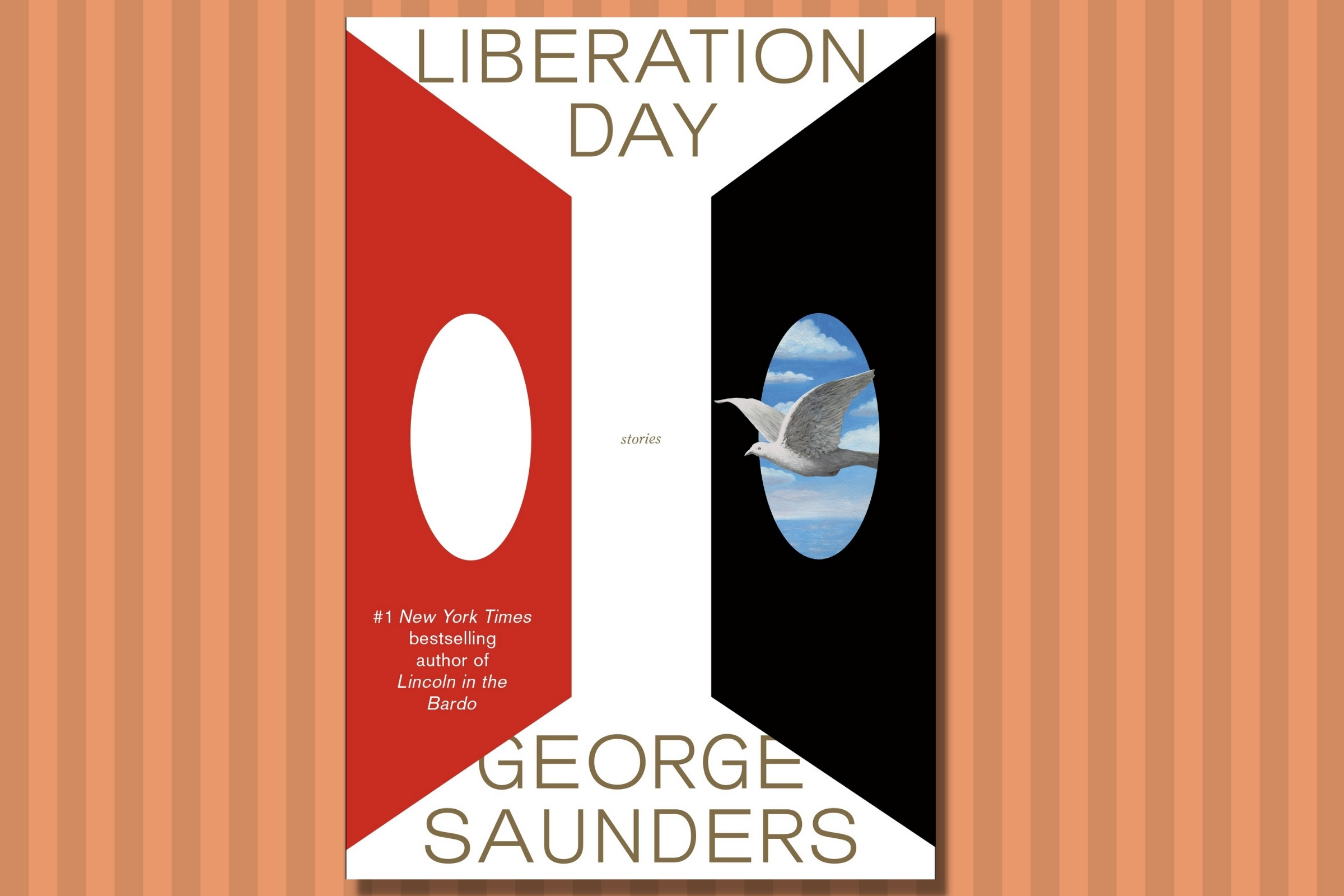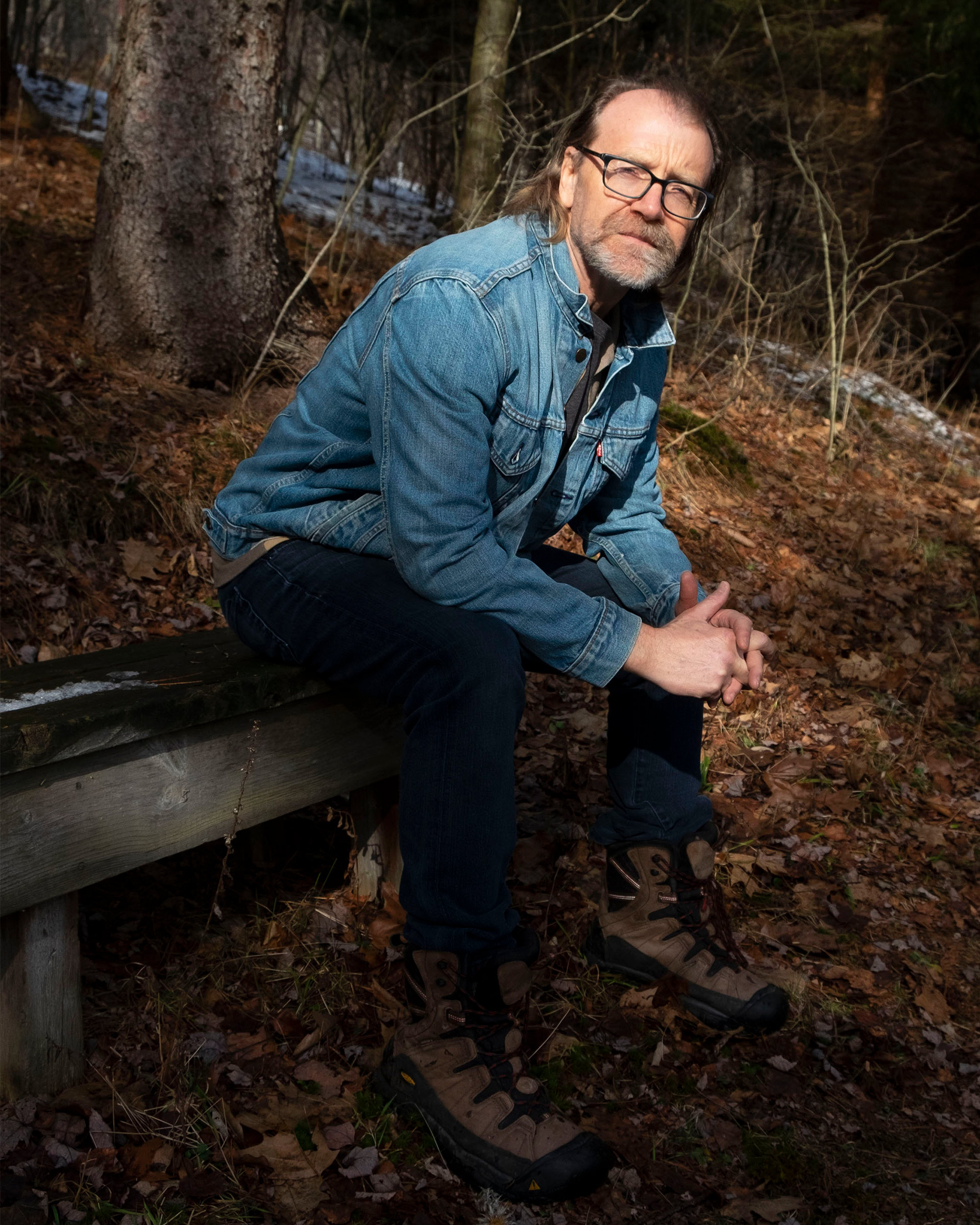George Saunders is that rare contemporary author who is as original as he is beloved—even rarer for having made his name on that often overlooked form of fiction, the short story. His first collection was the 1996 book CivilWarLand in Bad Decline, and even as his star has risen through the decades and he’s written in other forms—collections of essays, his Booker Prize–winning novel Lincoln in the Bardo—he keeps returning to stories.
Last year, the former MacArthur Fellow channeled his years of teaching fiction at Syracuse University into a tour-de-force literary class for the masses called A Swim in a Pond in the Rain, his book exploring short stories by Russian greats like Turgenev, Chekhov, and Gogol. Returning to one’s own short fiction after dissecting and exalting those masterworks takes a certain amount of guts. But readers can be assured that all the hallmarks of Saunders’ writing that electrified them from the beginning are present in his new collection, Liberation Day: bold original humor, the blurred view of American life, and the sweet humanity that pierces through it all.
With the collection, Saunders has settled into a new confidence in his experimentation and willingness to push himself and his readers. In one story, captive brainwashed human actors perform for a tycoon and his guests a re-enactment of the Battle of Little Bighorn, voicing the roles of General Custer and the Native Americans he attacked. In another, everyone at a company is doing something unethical, but only one sad woman suffers the consequences. Saunders spoke to TIME about optimism in writing, our craving for stories, and General Custer.
TIME: How did it feel to return to short stories, the form that you first became known for, after publishing your novel?
George Saunders: Honestly, for me, it feels like one long book. Even during Lincoln in the Bardo, I was working on a story about Mother’s Day that’s in this book. It feels like a long hike—I’m trying to get to a place where I can use the short-story form to better model how I actually feel about things. So there’s some joy, some fear, some loathing, some celebration. And with each book I’m getting closer to that place.
Read More: Lincoln in the Bardo Explores the Mind of a Mourning Abraham Lincoln
What was it like to write stories after your intensive study of Chekhov, Turgenev, and other Russian greats?
There was a little bit of feeling inspired, because getting inside those stories really got me energized about the form—and also made me realize there were things within the form that I hadn’t tried yet. Those Russian stories are so good at creating feelings of confusion and ambiguity on the part of the reader, and at the end, they say, “All these things are true.” They just leave you in that space, going, “What am I supposed to believe?” And the story’s going to say, “Well, all of it.” So that’s something I’m trying to do.
In Liberation Day, it feels like you’re leaning even more into ambiguity, leaving space for the reader’s interpretation.
It might have to do with the times in which it was written, because the highest form of wisdom I could find to get through the last three or four years is to say something like, “Admit everything. Admit all sides of the issue. Admit my own confusion about what’s going on politically and with COVID.” And don’t try to do what I might normally do, which is to tilt toward optimism or a sort of facile accommodation. Life is complicated. Let’s leave everything in.

When we spoke eight years ago about your short-story collection Tenth of December, you said that you were starting to write in a more optimistic mode. But—as you point out—in reading these new stories, it seems like you aren’t there now.
My hope is that the optimism is in the presentation. In other words, if somebody writes a good story about a sad situation, that’s inherently optimistic. I tried to take the long view, which is, on the day that I die—at 180 years old—I hope that the stuff I’ve left behind will be a full-bodied presentation of the full range of life. There are going to be times, in the world and in your personal life, when things seem hopeful, when you’re newly convinced of your potential to rise to negative occasions or you’re newly convinced that there are periods of heaven-like experience here on earth. There might also be a time when the opposite seems to be true, when it seems that we’re on a strange, downward trajectory, and the usual approaches are failing, and the things we took for granted are faltering. As I go through different things personally and as the public sphere changes, I try to just say, “OK, this is happening.” I give it permission to permeate my work in whatever way it wants to. It’s not mine to decide or edit—it’s my job to just be open and then filter or refract that through my artistic lens. It comes out like it comes out. In this book, there was a feeling for me that things in the world are changing in ways that I wouldn’t have imagined a few years ago.
In a lot of your stories, by the end you’re not really sure who’s right or who’s wrong. Why do you leave things open in that way?
When I’m reading, I always feel like I’m trying to figure out whose side the writer wants me on. And then as a writer, you’re aware of that—and you’re trying to make sure that you’re not sure yourself. Because of the form, you’re more willing to hear the other side of the story. A story wants to complicate a type into a particular, and when this happens, the character becomes, if not more lovable, at least more considerable.
How do you think about storytelling in our social media–dominated world?
If you think of how you came to love stories, somebody told you one when you were young, and it got under your skin in a way that was disproportionate. I remember going to see Mary Poppins as a kid, and of course falling a little bit for Julie Andrews, but also falling a little bit for the whole world—and then later, going to see Jaws, the same thing happened. We can’t say that storytelling is just some outdated thing that we should bring back alive for old times’ sake. It’s the central thing that we do, and we’re really good at it.
Where did your story about General Custer, the titular “Liberation Day,” come from?
Years ago, when I first studied at Syracuse, a professor told me to read Evan S. Connell’s Son of the Morning Star. Ever since, alongside books about Lincoln, I would read a book about Custer. After Lincoln in the Bardo came out, I was so happy that it was doing well. But of course, then you have an equal amount of feeling that you don’t have anything to follow up with. So I was kind of assessing what’s next, and I had this big dream one night of a beautiful novel—I could almost taste it—and I rolled over and wrote the title on my bedstand notepad, so I wouldn’t forget it. And when I got up in the morning, I saw what I’d written: “Custer in the Bardo.”
- Cybersecurity Experts Are Sounding the Alarm on DOGE
- Meet the 2025 Women of the Year
- The Harsh Truth About Disability Inclusion
- Why Do More Young Adults Have Cancer?
- Colman Domingo Leads With Radical Love
- How to Get Better at Doing Things Alone
- Michelle Zauner Stares Down the Darkness
